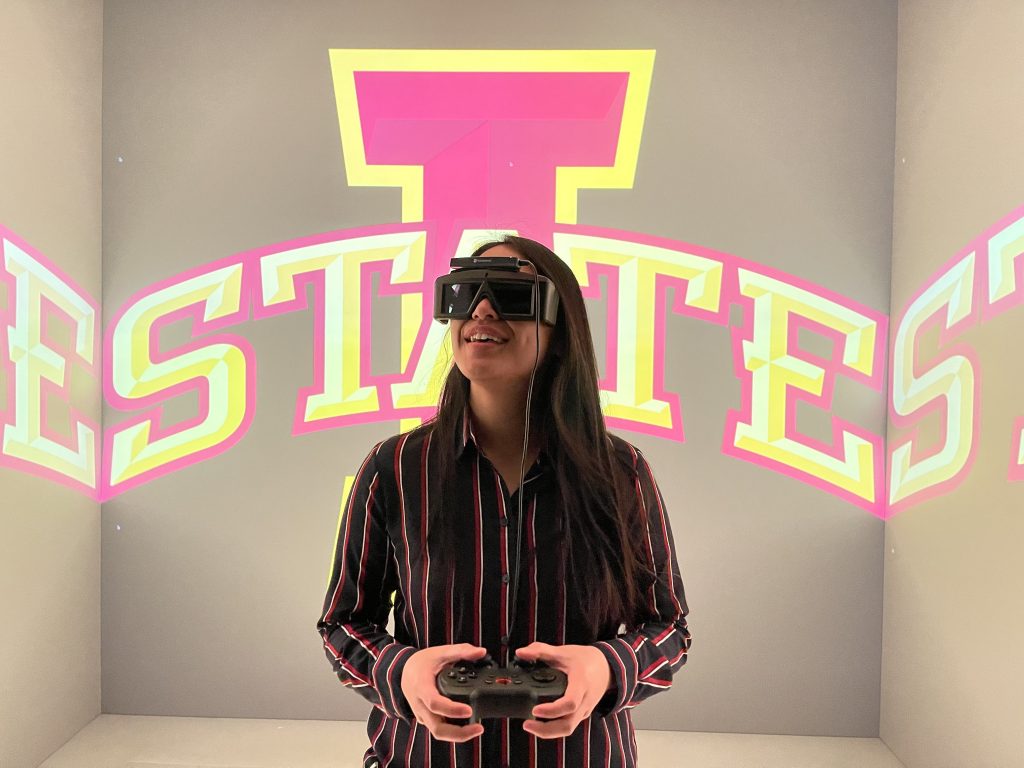ME/HCI grad student to advance VR research with support from prestigious NSF grant
Author: Nick Fetty
Author: Nick Fetty

An Iowa State University graduate student will have more flexibility of what she can study for her dissertation research after being selected for a competitive National Science Foundation (NSF) award.
Roselynn Conrady, Ph.D. student in mechanical engineering (ME) and human computer interaction (HCI), has been accepted into the prestigious NSF Graduate Research Fellowship Program. She is one of just five students from Iowa State University to receive this honor. The five-year fellowship includes three years of financial support including an annual stipend of $34,000 and a cost of education allowance of $12,000 to the institution.
“When I got the email I thought ‘this can’t be real’ but I let it sink in and I kind of struggled to sleep that night because I was so excited,” said Conrady. “Support from the NSF will allow me to pursue research more interdisciplinary in nature for my dissertation.”

Conrady came to Iowa State University via her hometown of San Diego, Calif. where she earned her B.S. in ME from San Diego State University (SDSU). As a first-generation college student, she wanted to pursue a major that would lead to a stable career so she could eventually support herself and her family. Growing up she liked to “tinker with things to figure out how they work” which led her to declare ME as her major. After attending a hackathon competition, she discovered the field of virtual reality (VR) which led her and some classmates to establish a VR student club at SDSU. While still an undergraduate, she applied to and was accepted into a research experience for undergraduates (REU) summer program through Iowa State University’s Virtual Reality Applications Center (VRAC) which led her to discover her passion for VR research.
That summer she worked with an ISU team that studied “social evaluative threat” (i.e., the fear of being judged by other people) specifically related to VR experiences. The project attempted to measure and assess this individual fear while participating in a VR dance competition. Conrady continued to work with ISU researchers following the REU, and as a result, she became a co-author on a paper titled “Evoking Stress Reactivity in a Virtual Dance Competition” which won the Best Paper Award at the 11th International Conference on Applied Human Factors and Ergonomics (AHFE 2020).
Conrady’s experience in Ames that summer went so well that returning to Iowa State for her graduate studies was an easy decision. She arrived on campus in January 2021, which for someone who spent nearly her entire life in sunny southern California, was a major transition.
“Weather is just something you learn to wrangle with and as long as you have a warm coat, it’s all good,” said Conrady. “Coming here has been a blessing. If I wouldn’t have come here, I wouldn’t have met so many nice people and had so many great experiences.”
One of those experiences includes trying foods that she previously didn’t know even existed, such as cheese curds and fried pickles.
“I didn’t realize people are so serious about their dipping sauces here. They are definitely diehard about their love for ranch,” she said.
Aside from the personal development she’s experienced during her time in Ames, she’s also grown professionally. She is currently working on a Boeing-supported research project with Eliot Winer, ME professor and director of VRAC. For this, the researchers are studying ways that first-time VR users react to the hardware and interface, and they hope to take their findings to develop VR systems that are user-friendly for people with varying levels of VR experience and comfortability. She recently presented findings from her research to representatives from Boeing.
For her dissertation, Conrady is studying ways to help mitigate the stress response of neurodiverse populations. For example, the act of hugging a loved one can mitigate anxiety and stress, even in neurodivergent individuals, such as those with autism spectrum disorder. Conrady hopes to develop a pneumatic-based upper-body hug device that is conducive to human movement allowing the user to feel the pressure of being squeezed during a hugging gesture. She wants to study ways that people react to the sensation of being hugged after inducing a stressful situation through VR. She hopes to involve underrepresented populations in her research so as to better serve individual communities and the state of Iowa as a whole.
Conrady is a member of the Iowa State Martial Arts Club and recently started training in taekwondo, which she said is nice way of blowing off steam after a long day. Additionally, she unwinds by playing video games, particularly the Final Fantasy series, Apex Legends, Dota 2 and Overwatch. Conrady has found a home for herself at Iowa State, and while she is excited to complete her studies so she can take the next step in her professional journey, she said she is enjoying her time in Ames while it lasts.
“People sometimes ask me ‘You left California for Iowa?’ And I proudly tell them ‘Yes.’ Coming to Iowa, I now realize this is my home just as much as California is,” she said.